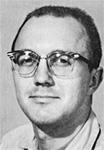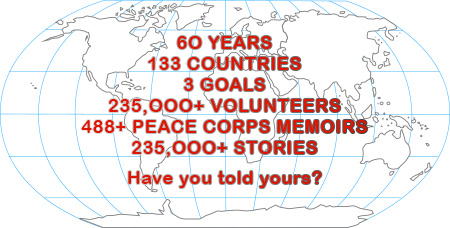My Peace Corps Story — Frank H. Tainter (Chile)
by Frank H. Tainter (Chile 1964-66)
•
My Peace Corps experience was the most profound event of my life and I still spend much time musing over that experience. As I approach 80 years of age, those two years have become even more sharply into focus.
I was raised in the Midwest, primarily in a German/Polish cultural environment with a large splash of Scandinavian thrown in. Neither of my parents graduated from high school, and based on their life experiences, both constantly insisted that I go to college and get an education.

Frank H. Tainter
I wanted to study forestry but was told that it was one of the most difficult majors as one had to take not just courses relating to forestry but in many other disciplines such as sociology, economics, and psychology. Eventually I left home and worked for a forestry degree at the University of Montana, earning a forestry degree in Forest Management with a minor in Wood Utilization in the spring of 1964.
The difficult career choice I then faced was to, either work in a sawmill in Missoula and eventually earn a management position in the company, or work with the United States Forest Service or the Bureau of Land Management as a forest manager, or continue my studies in graduate school toward a Master’s Degree in some aspect of forestry. I had already done enough field research work in the preceding year to qualify for an MS in Forestry. But, during my last year I pondered what I might do with the rest of my life, knowing that whatever I chose, that path might be one I would eventually regret. Then, I recalled the speech by President John F. Kennedy, “Ask not what your country can do for you but what you can do for your country,“ when he established the Peace Corps.
Two months after I applied I received acceptance to be sent to Chile. I was delighted! I immediately felt that I had made a good choice. Of course, my parents did not want me to go. I had already read all I could find about the forests in South America and looked forward to the opportunity.
I was a part of Chile 6 and sent for training at NC State in Raleigh, North Carolina. Our group consisted of several dozens of mostly young males, but a goodly number of females, and a few elderly folks. Most of the group were sent to southern Chile to work in Community Development.
About a dozen of us with forestry degrees, or wildlife degrees, went to the Forestry Institute in Santiago. We were to stand in for the lack of Chilean forestry technicians in a program sponsored by the Food and Agriculture Organization of the United Nations. Its purpose was to promote the use of wood in the local Chilean economy and develop potential products for export. Most of my group worked in forest inventory and measured forest plantations and native stands to determine the volume potential available and its economic value.
One volunteer was assigned to work in the area of developing low-cost housing using wood as a major building material. At that time most housing was of adobe or concrete construction and was liable to be damaged by earthquakes, and also was expensive to build. Another volunteer worked on a project to develop tree nurseries.
I investigated various aspects of wood technology such as determining the equilibrium moisture contents of different wood species used in the manufacture of the furniture that would be used in quite variable climates within the country. Another project determined the durability of Chilean paints and varnishes used throughout the length of the country. Wood samples of various species were placed in special houses located throughout Chile and analyzed periodically. Since radiata pine had been extensively planted in Chile we also oversaw various strength tests of construction timbers of that species. During my tenure, I also developed a procedure to identify Chilean woods by light microscopy and later published a bulletin of that procedure.
During my time in Chile, I learned a lot about Chile and its culture. I learned the language. The people I worked with were the most amazing and I could never have imagined the memories I still have of them. The FAO experts were also great.
After much thought, I decided that I was going to study for graduate degrees in forest pathology. During my subsequent career, I became one of about 100 forest pathologists worldwide and I knew most of them. My PC experience allowed me to interact with them with confidence and I did research work in southeastern United States, Chile, Mexico, Colombia, and Ecuador.
Shortly before my time in Chile was over, I married a Chilean lady. This was certainly another significant experience that never would have happened if I had not lived in Chile for two years. It also expanded my Chile experience because I saw what effect US involvement can have when it decided to support a military coup in 1973. Most of my comrades at the Institute either left Chile immediately after the coup, others were imprisoned and tortured. The Institute was converted into a complex of torture houses. My co-worker spent 3 months in the soccer stadium and was nearly executed for his “socialist” views. Some of my wife’s family were tortured and murdered. What an experience!
But, we eventually had two beautiful daughters who, like us, also have a worldly view of things. And I now have an extended family, and during the following decades I made many trips to Chile. I have enjoyed a full and satisfying life, a very full life that I cannot adequately describe in words.
 That experience compelled me to write a novel, ¿Eres tú?: Una historia de Lonquimay, a sort of a metaphorical statement of what I and my family, and my former co-workers, had experienced, or perhaps had hoped to experience, in a desired separate universe. Those of you who have read poems by Pablo Neruda will know of what I speak. I will be eternally grateful for my PC experience!!!
That experience compelled me to write a novel, ¿Eres tú?: Una historia de Lonquimay, a sort of a metaphorical statement of what I and my family, and my former co-workers, had experienced, or perhaps had hoped to experience, in a desired separate universe. Those of you who have read poems by Pablo Neruda will know of what I speak. I will be eternally grateful for my PC experience!!!
•
Frank Tainter is an emeritus professor of forest pathology from Clemson University and has published more than 140 scientific articles. During his career, he has researched causes of tree diseases in the United States, Chile, Mexico, Colombia, and Ecuador. He currently resides with his wife, Maria Magdalena, in Bozeman, Montana.

A great PC story, Mr.Tainter, example of a profound experience shaping someone’s entire future! Thanks for sharing!
A review of Mr. Tainter’s book, “Eres Tu?” is at: https://peacecorpsworldwide.org/?s=Eres+Tu
This fascinating book is more than a fictionalized memoir. It is also an archeological history of the native people of a mountain valley and a field guide to medicinal plants native to Chile. I recommend it.
frank, just found your article about peace corp experience in chile. enjoyed reading it. lyman martin
frank, i wanted to add a comment, do you still have your coonskin cap, classmate lyman martin
Frank, you mention listening to JFK’s – “Ask not what your country can do for you but what you can do for your country,“ which motivated you to join the Peace Corps. I too listened to JFK who, when speaking about education, urged young people “To stay in school as long as you can.” – Perhaps we never would have met had we both not listened to JFK.